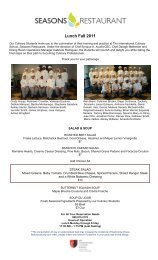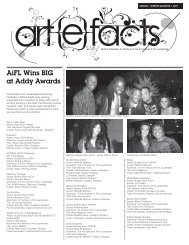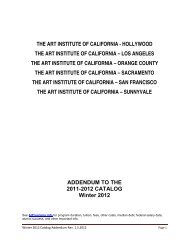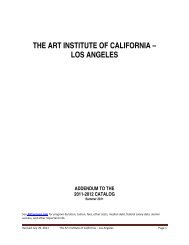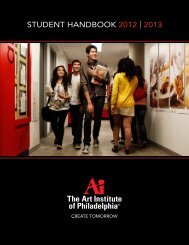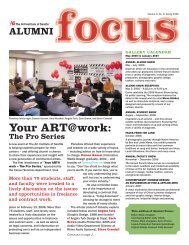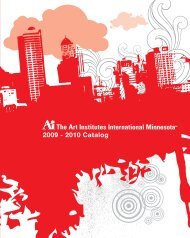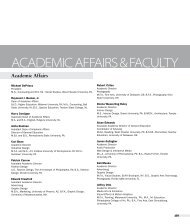CATALOG 2011-2012 - The Art Institutes
CATALOG 2011-2012 - The Art Institutes
CATALOG 2011-2012 - The Art Institutes
You also want an ePaper? Increase the reach of your titles
YUMPU automatically turns print PDFs into web optimized ePapers that Google loves.
<strong>The</strong> interim suspension is not to be<br />
considered disciplinary, but it is a tool<br />
to separate potential adversaries until<br />
a reasoned decision can be made.<br />
VIII. APPEAL PROCEDURES<br />
Students have a right to appeal disciplinary<br />
actions when they believe they have extenuating<br />
circumstances or believe to have been treated<br />
in an arbitrary or biased fashion or without<br />
adherence to <strong>The</strong> <strong>Art</strong> <strong>Institutes</strong> International<br />
Minnesota policies and procedures.<br />
• During an appeal, the student should<br />
continue to obey the terms of the decision,<br />
i.e., a student who has been suspended from<br />
school may not be on school property, a<br />
student dismissed from school-sponsored<br />
housing must leave in accordance with<br />
the directions indicated in the decision.<br />
• <strong>The</strong> student must write a letter of appeal<br />
in the student’s own words, addressed<br />
to the President of <strong>The</strong> <strong>Art</strong> <strong>Institutes</strong><br />
International Minnesota or his/her<br />
delegate. This letter must clearly state the<br />
extenuating circumstances or the grounds<br />
for believing the decision was arbitrary or<br />
biased or that it was without adherence to<br />
<strong>The</strong> <strong>Art</strong> <strong>Institutes</strong> International Minnesota<br />
policies and procedures, and provide any<br />
supporting documentation. It must be<br />
delivered to the President or his/her delegate<br />
within seven calendar days following<br />
the student’s receipt of the decision.<br />
• Students should provide documentation<br />
to support the allegations of the appeal.<br />
• <strong>The</strong> President or his/her delegate may<br />
appoint an ad hoc committee to review<br />
appeals and make a recommendation<br />
regarding disposition of the appeal within<br />
30 days of the date of receipt of the appeal.<br />
This committee will be comprised of<br />
faculty or staff members not involved in<br />
making the initial disciplinary decision.<br />
• <strong>The</strong> President and/or the committee may<br />
decide to convene an appeal hearing.<br />
<strong>The</strong> student will be informed notified in<br />
writing of the date and time of the appeal.<br />
<strong>The</strong> student is expected to attend the<br />
meeting, and failure to do so, for other<br />
than documented emergencies, may be<br />
considered forfeiture of the right to present<br />
further information regarding the appeal.<br />
• <strong>The</strong> student making the appeal may be<br />
provided an opportunity to address the<br />
committee in person. <strong>The</strong> student may<br />
be accompanied by one person (family<br />
member, friend, etc) as an observer. <strong>The</strong><br />
committee may prohibit from attending<br />
or remove any person who disrupts<br />
the proceedings of the committee.<br />
• <strong>The</strong> Appeal Committee is an academic<br />
hearing, not a legal hearing. <strong>The</strong>refore, legal<br />
counsel is not allowed at the meeting.<br />
• Audio recording of the academic<br />
hearing is not permitted. Minutes<br />
of the meeting are confidential.<br />
• Following appropriate review and<br />
deliberation, the committee will report back<br />
to the President or his/her delegate with its<br />
recommendation following its review of the<br />
appeal. <strong>The</strong> President or his/her delegate<br />
will render a written decision on the appeal<br />
within thirty calendar days from receipt<br />
of the appeal. <strong>The</strong> decision will be final.<br />
Academic Integrity Policy<br />
Consistent with its mission and values, <strong>The</strong> <strong>Art</strong><br />
<strong>Institutes</strong> International Minnesota seeks to<br />
guide students to develop ideas and concepts<br />
that are their own. Any student who engages<br />
in conduct that violates principles of academic<br />
integrity and honesty is subject to disciplinary<br />
proceedings under the Student Code of Conduct.<br />
Academic integrity includes the<br />
following expectations:<br />
1. Students shall allow others to<br />
receive credit for their work by:<br />
a) Refraining from intentionally or<br />
inadvertently presenting the ideas of<br />
others as their own;<br />
b) Refraining from assisting others<br />
in presenting the work of<br />
someone else as his/her own.<br />
2. Students shall refrain from receiving or<br />
giving assistance on course assignments or<br />
tests beyond the guidelines established by<br />
the course instructor.<br />
3. Students shall refrain from falsifying,<br />
fabricating, or distorting data through<br />
omission.<br />
4. Students shall refrain from misrepresenting<br />
his/her personal accomplishments.<br />
Violations of the Academic<br />
Integrity policy include:<br />
Plagiarism: the act of representing someone<br />
else’s work as the student’s own regardless<br />
of the intent. <strong>The</strong> presentation of written<br />
documents, still or moving images, original<br />
ideas, research information, audio samples<br />
and music clips that are not the student’s own<br />
work without proper citation is plagiarism.<br />
Cheating: the act of receiving or giving assistance<br />
on written or electronic assignments, exams,<br />
or documents submitted as original pieces<br />
of work. This includes bringing unauthorized<br />
written notes, programmed material in watches,<br />
calculators, PDAs, cell phones, or laptops to<br />
in-class assignments, tests or exams, or takehome<br />
assignment or exams that exceed the<br />
guidelines set by the course instructor.<br />
Aiding and abetting another individual in<br />
cheating and plagiarism is considered a<br />
violation of the Academic Integrity policy.<br />
Disciplinary Sanctions:<br />
At <strong>The</strong> <strong>Art</strong> <strong>Institutes</strong> International Minnesota,<br />
violations of the Academic Integrity policy<br />
are cumulative offenses throughout the<br />
student’s career at the college: each act of<br />
plagiarism or cheating is documented in the<br />
student’s judicial record, held in the Office of<br />
the Dean of Student Affairs, and the student’s<br />
academic record in the Registrar’s office.<br />
Violations of this policy will be handled in<br />
accordance with the disciplinary procedures<br />
outlined in the Student Conduct policy.<br />
1st Offense:<br />
• Failure of the assignment or examination<br />
(0 points) with no opportunity to re-do or<br />
make up work that has been plagiarized<br />
or produced as a result of cheating.<br />
<strong>The</strong> faculty member should calculate a<br />
course grade as if the assignment had<br />
been submitted but received no points.<br />
Depending on the weight and timing of<br />
the assignment or exam, this may result<br />
in the student’s failure of the course.<br />
• Documentation of the plagiarism or<br />
cheating is filed in the student’s judicial<br />
record in the office of the Dean of Student<br />
Affairs and in the student’s academic<br />
record in the office of the Registrar.<br />
2nd Offense:<br />
• Failure of the course.<br />
• A letter of Academic Warning is sent by the<br />
office of the Dean of Academic Affairs.<br />
• Documentation of the plagiarism or<br />
cheating is filed in the student’s judicial<br />
record in the office of the Dean of Student<br />
Affairs, and in the student’s academic<br />
record in the office of the Registrar.<br />
3rd Offense:<br />
• Failure of the course.<br />
• Documentation of the plagiarism or<br />
cheating is filed in the student’s judicial<br />
record in the office of the Dean of Student<br />
Affairs, and in the student’s academic<br />
record in the office of the Registrar.<br />
• Possible suspension/termination from<br />
<strong>The</strong> <strong>Art</strong> <strong>Institutes</strong> International Minnesota<br />
with right to appeal as per procedures set<br />
forth in the Student Code of Conduct.<br />
STUDENT GRIEVANCE<br />
PROCEDURE FOR INTERNAL<br />
COMPLAINTS OF DISCRIMINATION<br />
AND HARASSMENT<br />
Students who believe they have been subjected<br />
to discrimination or harassment in violation<br />
of the Non-Discrimination Policy should<br />
follow the procedure outlined below.<br />
Sexual violence is considered to be a form<br />
of sexual harassment, and therefore is also<br />
considered a form of sex discrimination. This<br />
complaint procedure is intended to provide a<br />
fair, prompt, impartial and reliable determination<br />
about whether <strong>The</strong> <strong>Art</strong> <strong>Institutes</strong> International<br />
Minnesota Non-Discrimination Policy has<br />
been violated. This complaint procedure is<br />
intended to provide a fair, prompt, impartial<br />
and reliable determination about whether<br />
discrimination or harassment has occurred<br />
1. Complainants are encouraged to file a<br />
complaint as soon as possible after an alleged<br />
incident of discrimination or harassment<br />
has occurred. Any student who chooses to<br />
file a discrimination complaint should do<br />
so for non-academic matters with Dean of<br />
Student Affairs or for academic matters with<br />
Dean of Academic Affairs. <strong>The</strong> complaint<br />
should be presented in writing and it should<br />
describe the alleged incident(s) and any<br />
corrective action sought. <strong>The</strong> complaint<br />
should be signed by the complainant.<br />
2. <strong>The</strong> Dean of Student Affairs or Dean of<br />
Academic Affairs will investigate the<br />
allegations. Both the complainant and<br />
the accused will have an opportunity to<br />
meet and discuss the allegations with the<br />
99



